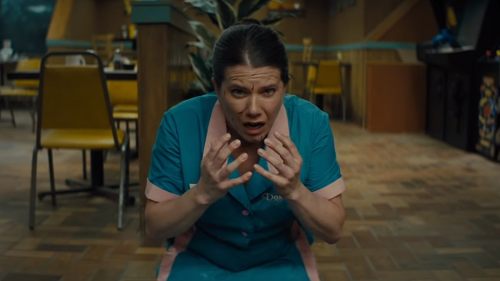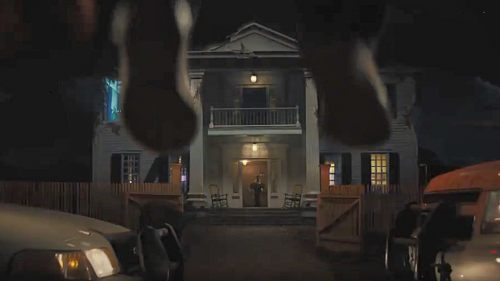BRIGHTBURN Review: Superhero Mythology Meets Schlocky Horror
It's a neat concept: What if Superman, but evil? Unfortunately, Brightburn barely manages to rise above that concept, turning it into more of a gimmick than anything else. The genre-bending super-powered horror film, directed by David Yarovesky and produced by James Gunn, is suitable B-movie schlock, and enjoyable enough – with an asterisk. Elizabeth Banks and David Denman play Tori and Kyle Breyer, a married couple living in the midwest. Not unlike Ma and Pa Kent, they have a farm surrounded by fields; the kind of place that would make for a nice shot of someone walking through the tall grass during magic hour. The opening scene finds the two in bed, trying to conceive a baby; we know they're struggling with fertility thanks to heavy-handed shots of their bookcase, packed with manuals on how to make babies. They're interrupted by the crash-landing of a spaceship, containing a tiny infant boy. And like Ma and Pa Kent, they adopt the alien kid as their own, raising him to be a good midwestern boy. Unfortunately, as Brandon comes of age, his powers come into effect, and what seems like a difficult growth spurt quickly reveals itself as something far more sinister.
Brightburn has slightly more on its mind than its mere, admittedly tantalizing gimmick: The inherent notion of nature versus nurture; the suggestion that perhaps toxic masculinity isn't learned, but an internalized system that must be un-learned; the idea that maybe sometimes, despite the best efforts of decent parents, boys grow up to be horrible, violent misogynists who can't help but destroy the world. But the script, co-written by Brian and Mark Gunn, has a clumsy handle on these themes. It doesn't help that the film doesn't spend any time developing Brandon as a character, rapidly transitioning from home videos of baby Brandon to 12-year-old burgeoning sociopath. Also working against Brightburn is its lack of female perspective; when Brandon inevitably becomes a murderous psychopath, it's his father, Kyle, who calls him out on his bullshit while Tori remains firmly in denial. (To be fair, she wears vintage Ramones t-shirts, so we know she's not like a regular mom; she's a cool mom.) Maybe if Brightburn was written or at least directed by a woman, the film would have a better grasp on Tori's character. It's difficult not to think of Lynne Ramsay's We Need to Talk About Kevin, which exists in the same thematic ballpark. That film wasn't shy about its exploration of internalized maternal norms and the specific guilt that comes from feeling as though you've failed as a mother. In a sense, Ramsay's film is the inverse of Brightburn, both in how it considers nature versus nurture and its contemplation of inherent monstrosity; just as Kevin's psychopathy was innate and unavoidable, so too was his mother's inability to connect with him – or maybe she sensed his lack of humanity all along.
Yarovesky's film is not nearly as complex, though you get the feeling that it wants to be – or at least it's trying to be, as when Brandon's uncle gifts him a rifle for his 12th birthday. Kyle angrily disapproves, despite his own hunting hobby (do as I say, not as I do is the American way), sending Brandon into a tantrum. There's also Brandon's treatment of women, which is so stereotypically misogynist that it's occasionally laughable: He stalks a classmate who later refuses to participate when they're partnered up in gym class. She tells their teacher that Brandon's been acting creepy and making her uncomfortable, but the teacher forces her to interact with him anyway. And then Brandon breaks her arm. His parents discover a trove of pornography hidden under Brandon's mattress; buried between photos of nude women (including one whose mouth has been torn off) are vivid pictures of internal organs and viscera. The two police officers on Brandon's trail are a woman and a black man. The symbolism is absurdly on-the-nose.
It may seem like a counter-intuitive criticism, but Brightburn lacks empathy for Brandon. There's no reason for the audience to want him to better or care about his potential redemption, which means there's no reason for us to care when Tori is distraught over the realization that her son is a violent murderer. It's impossible to empathize with violent white men – the kind who commit mass shootings in the name of bigotry and misogyny. We can, however, empathize with the children they once were and the parents who raised them. But Brightburn isn't interested in either of these things, nor does it offer the necessary nuance that such complex ideas demand. Instead, it's superhero schlock with an edgelord sense of humor and gore – only a hair removed from the same kind of jokes that got James Gunn fired. That's not to say Brightburn is offensive (though surely some people will take issue with it), but the scenes of violence and gore serve little purpose beyond provocation; isn't it shocking that this 12-year-old dropped a truck from 20 feet up, forcing a steering wheel to tear this dude's jaw in half?! Sure, I guess. Maybe those moments wouldn't feel so senseless if the film around them respected its own themes. Or maybe three white guys aren't exactly the best people to tell a story about toxic white masculinity in modern America.



